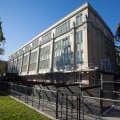Community municipal budget boards are responsible for assessing the needs of their neighborhoods, meeting with city agencies, and making recommendations in the City's budget process to address them. Every month, CB8M committees meet to discuss and resolve problems in the community. Land use and zoning are important matters that community boards should be consulted on. This includes the location of most municipal facilities in the community and other land use issues.
Boards play an important advisory role in dealing with issues of land use and zoning, the municipal budget, the provision of municipal services, and many other issues related to the well-being of their communities. The Community Board office can help resolve issues by acting as a liaison between citizens and the appropriate municipal agency. Board members are your neighbors: people who live, work, own a business, or have some other important interest in the Community District. Manhattan Community Board 11 (CB1) meets the third Tuesday of every month, except in July and August.
The questions asked during these meetings are direct and related to whether attendees have attended meetings before and what their motivations and interests for joining the board are. These types of calls also provide the Community Board with important indicators of the levels of resources that might be most needed in the district, reflected in the types of calls received. The Community Boards were created by City Charter, and their roles and responsibilities are defined in chapters 69 and 70. The CB11 District Office has two main functions: processing complaints and requests for services from citizens and providing administrative support to the Community Board.
While the public is encouraged to attend and observe the Community Board's procedures, only Board members can discuss and vote on any motions that are presented. New York City government community boards are advisory groups appointed by community districts in the five boroughs. The Community Board, its district manager, and its office staff act as advocates and service coordinators for the community and its residents. The primary mission of these boards is to advise elected officials and government agencies on issues affecting the social welfare of the district.
Board meetings are open to the public and a portion of each meeting is reserved for members of the public to speak. In addition, any request for a change or variation of the zoning resolution must be submitted to the Board for review, and their position will be considered in the final determination.




